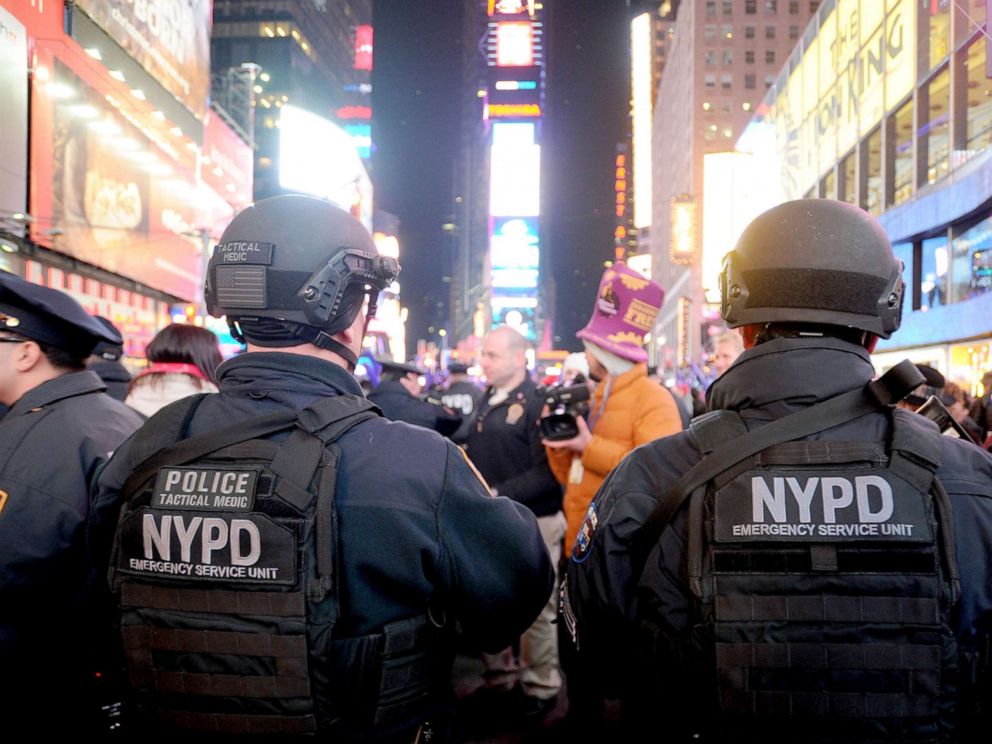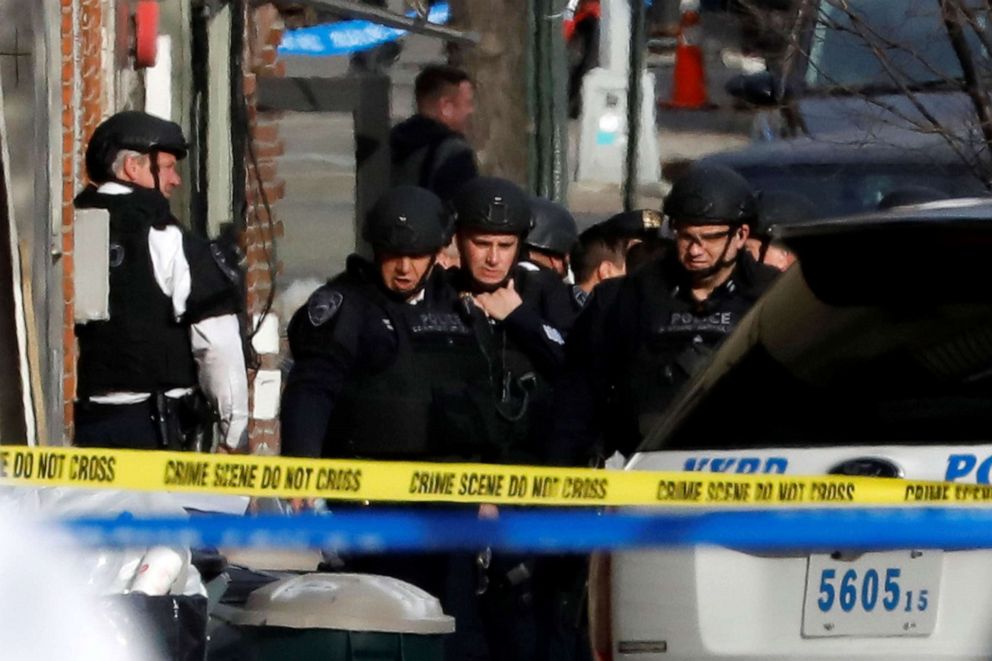Amid calls for police reform, better training needed to handle mental health emergencies: Experts
Some departments use crisis intervention programs.
It's a scenario that you've likely heard about from time to time.
Police are sent to respond to a call of a mental health emergency and in some cases, there are tragic results.
While some departments have implemented protocols to address these situations, sending in teams of experienced officers with special training, using police in these scenarios been called into question amid the larger conversation about law enforcement reform surrounding George Floyd's death.
Some mental health experts warn that sending officers to calls involving severe suicidal thoughts or a person experiencing a violent psychological episode is not always the best solution.
Although officers are trained to handle tense situations, foiling a robbery or assault is not the same as someone who is in deep mental distress, according to Dr. Adwoa Akhu, a clinical psychologist and an adjunct professor at John Jay College of Criminal Justice.
“It can be terrifying and depending on how the police person shows up, it could escalate things or it can comfort it. It depends on how police officers present themselves,” she told ABC News.
A report issued this month by The Journal of the American Academy of Psychiatry and the Law found of the nearly 1,000 people shot by police officers in 2018, a quarter had a mental illness.

Akhu and other experts say some police departments are making progress with new training and specialized teams that are deployed to mental health emergencies, but there is still a way to go.
Ajima Olaghere, an assistant professor of criminal justice at Temple University, said a major roadblock for effective responses to mental health emergencies is the fact that there is no uniform policy across the nearly 18,000 police departments across the country.
“We can safely assume that there is a lot of variation in how police academies and police departments may train officers to respond to individuals in crisis,” she said in an email to ABC News. “Across this variation, there are differences in how crisis intervention training may be prioritized and institutionalized as an aspect of police services.”
Olaghere said that there has been some progress over the last couple of decades as some major police departments have been enacting reforms to better prepare their officers and other first responders to mental health emergencies.
In 1988, the Memphis Police Department unveiled a model known as the Crisis Intervention Team. Under CIT training, select officers receive a 40-hour preparation from mental health workers on how to handle persons with mental illness, dispatch operators are given training on how to spot an emergency call involving a person with mental illness and officers drop off the person at a centralized mental health facility instead of jail.
There are currently 2,700 CIT programs in use throughout the country, which represent about 15 to 17% of the nation’s police forces, according to the JAAPL report.
One of the departments that use CIT is the NYPD, which receives an average of 175,000 911 calls a year for “emotionally disturbed persons,” or EDPs, according to an NYPD spokesman. EDPs are defined by the NYPD as "persons who appear to be mentally ill or temporarily deranged and are conducting themselves in a manner in which a uniformed member of the service reasonably believes is likely to result in serious injury to themselves or others," according to the department's 2018 use of force report, the latest available.
The NYPD spokesman said that 15,000 officers have been certified through its CIT program since it started in 2015, and during emergencies involving an EDP, highly trained Emergency Service Unit (ESU) officers are deployed. If the situation involves a person who has isolated themselves and refused to comply with officers, the Hostage Negotiation Team (HNT) will be requested, according to the NYPD spokesman.
In 2018, the NYPD used force in 1,400 EDP calls (about 0.8%), and in 80% of those instances, officers used the "lowest level of physical force," according to the 2018 use of force report. A stun gun was used in 0.1% of the encounters, according to the report.
“Our patrol officers and supervisors work in tandem with our elite units to deescalate and offer quick and effective aid to those with behavioral health concerns,” the spokesman said in a statement to ABC News.
The NYPD spokesman added the department is always evolving and adapting its mental health response training and recruits are given training on de-escalation tactics.
Akhu, who helps the NYPD train its ESU and HNT units, said there is still a problem when it comes to other officers, who she said only receive a day of exercises about mental health issues. She said their basic training for emergencies might supersede the limited understanding of a mental health emergency. Officers in the ESU and HNT units, by comparison, get five days of training on mental health issues, she said.
“Police officers who are trained as paramilitary may not recognize a mental health crisis and treat it as something else,” Akhu said.
Dr. Jennifer Skeem, a professor of psychology at the Goldman School of Public Policy at UC Berkeley, who has researched police mental health reforms, agreed and said this stems from the general stigma against mental illness in the country.
Although CIT training has shown some successes, Skeem said it should not be sole solution to improving mental health emergency responses.
“It’s been reduced to this idea that you give 40 hours of training to this team and they’re ready to answer mental health calls,” she told ABC News.
Skeem said police departments should come up with new tactics and strategies to address these problems. Most importantly, they should expand the use of programs that have been established in some precincts where psychology professionals are deployed to handle those emergency calls that involve mental health.
The NYPD has Co-Response Teams, which pair two officers with a city Department of Health & Mental Hygiene clinician to emergency calls that involve a person with mental health issues.
Two years ago, the Dallas Police Department, Dallas Fire-Rescue Department and Parkland Hospital created the Rapid Integrated Group Healthcare Team or RIGHT Care where specially trained paramedics, police officers, and mental health professionals are deployed to emergency mental health calls in four ZIP codes.
A mental health clinician is staffed in the city’s 911-call center and coordinates with the team.
Jason Evans, a spokesman for Dallas Fire-Rescue, said last year RiIGHT Care received over 4,000 calls and the unit helped 3,377 patients connect to appropriate care. Parkland’s psychiatric emergency room admissions from those ZIP codes decreased by 20% after the program’s first year, according to the hospital.
The departments are making a push with the city council to expand the program to other parts of the city, according to Evans.
“In the first two years we feel the program has been doing great,” he told ABC News.

Skeem said researchers are currently studying the effectiveness of this program, but in general, having cooperation between trained mental health professionals and law enforcement is a step in the right direction.
“That will help build a bridge between the police, community and other agencies,” she said.
In the meantime, Skeem said it is vital that law enforcement agencies focus training on mental health problems and the use of effective de-escalation tactics to crack down on the stigma and avoid any use of force.
“A lot of these reforms or model programs have been developing already. I hope this creates the human, political and agency will to implement the strategies that are quite different,” she said.





